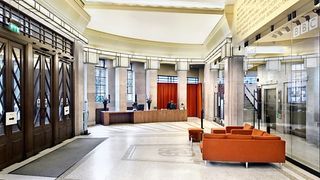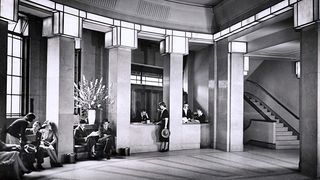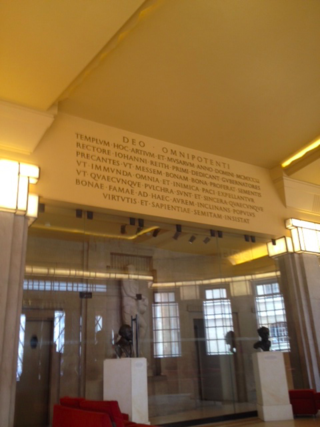BBC Latin
I have spent a bit of time in the last few months sitting in the entrance hall of Old Broadcasting House, the wonderful 1930s building that was the first monumental home of the BBC. It is (or was) a splendid welcome to the building. It has been very nicely restored, but you can't help noticing that it is now equipped with glass panels, security checks and revolving doors that stop any of the unauthorised just walking in. (The picture above manages cleverly to conceal most of that, but you can see the glass on the right.)
I fell to wondering a few weeks ago, as I was waiting there, what it would have looked like in Lord Reith's day. Well the answer is in the picture below, taken 1931.
It's almost identical, except that you could obviously just walk in, wave at the reception, and pop directly up the stairs (no visitor badge or whatever). And as someone I was talking to recently pointed out, whatever the cleanliness of the picture, it was presumably a complete fug of cigarette smoke in almost any period up to the 1990s.
But there's more to it than that. Not only are there the famous Eric Gill sculptures, but as I concentrated on it for the first time last week, I was struck by a long Latin inscription, just visible in the top picture.
Here you see it better (and you can also see how the Eric Gill sculpture is now cut off behind the glass). The text is quite easy, more or less biblical Latin:
DEO OMNIPOTENTI TEMPLUM HOC ARTIUM ET MUSARUM ANNO DOMINI MCMXXXI RECTORE JOHANNI REITH PRIMI DEDICANT GUBERNATORES PRECANTES UT MESSEM BONAM BONA PROFERAT SEMENTIS UT IMMUNDA OMNIA ET INIMICA PACI EXPELLANTUR UT QUAECUNQUE PULCHRA SUNT ET SINCERA QUACUNQUE BONAE FAMAE AD HAEC AVREM INCLINANS POPULUS VIRTUTIS ET SAPIENTIAE SEMITAM INSISTAT
or in English:
This Temple of the Arts and Muses is dedicated to Almighty God by the first Governors in the year 1931, John Reith being Director-General. It is their prayer that good seed sown may bring forth a good harvest, that all things hostile to peace or purity may be banished from this house, and that the people, inclining their ear to whatsoever things are beautiful and honest and of good report, may tread the path of wisdom and uprightness.
Not a bad text for the front hall of BBC HQ I thought. But who wrote it, with all those echoes of Paul's Letter to the Philippians?
It didnt take long to discover that it was one of the early governors, classicist and by then ex-headmaster on Winchester School, Montague Rendall. I confess I had never heard of him, but his entry in the Dictionary of National Biography conjures up a completely other world, though less than a hundred years ago."His educational ideal" it sharply put, "was a nebulous mixture of traditional Christian values (uncomplicated by any theology) and neo-medieval chivalry." "His vivid and dominating personality enabled him to communicate to the school his intense vision of the noblest aims in life." And in the well worn code, "resolutely unmarried".
But he could turn out some neat Latin and a still powerful "mission statement" for the BBC: "that the people, inclining their ear to whatsoever things are beautiful and honest and of good report, may tread the path of wisdom and uprightness". Taking away the whiff of 1930s piety, I could go along with that.
Mary Beard's Blog
- Mary Beard's profile
- 4110 followers






